Charlotte Brontë Jane Eyre
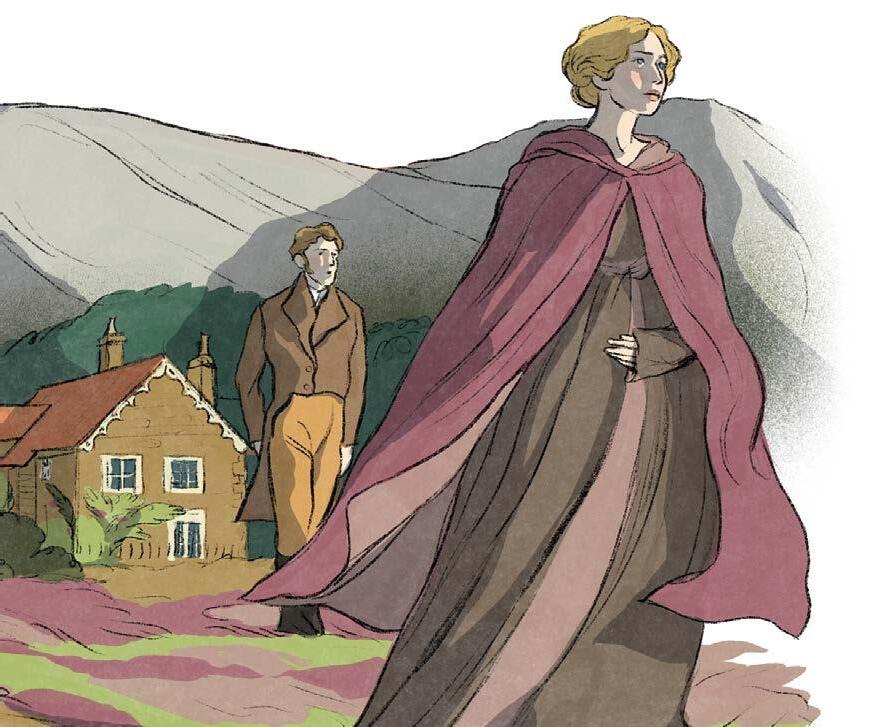


Information about the author, the story and the historical period.
Brief descriptions of the main characters.
The text with cultural details, brief summaries and glossary.
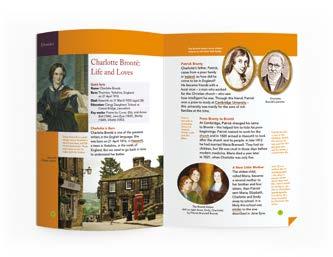
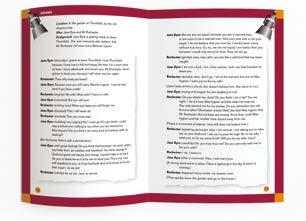

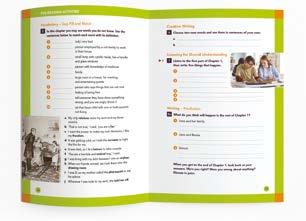

Pre-reading activities.
A wide variety of activities covering Cambridge Exam Certificates, State exams, 21st Century Skills and 2030 Agenda topics.

A final test to check what you remember.
A transcript of one of the most important scenes from the story to act out together in class.

Costituzione e Cittadinanza
Sir Arthur Conan Doyle The Sign of the Four
E. Gaskell, K. Chopin, K. Mansfield, V. Woolf, E.Wharton Portraits of Women
Robert
Louis Stevenson The Strange Case of Dr Jekyll and Mr Hyde
Geoffrey Chaucer The Canterbury Tales
Jane Austen Pride and Prejudice
Lewis Carroll Alice in Wonderland
Oscar Wilde The Canterville Ghost
H.G. Wells, G. Orwell, E.A. Poe, S.O. Jewett, V. Woolf One Planet, One Goal
Mary Shelley Frankenstein
George Orwell Animal Farm
K. Mansfield, J. Joyce, O. Wilde, R. Tagore, M. Twain Tales of Friendship
Charlotte Brontë Jane Eyre
Oscar Wilde The Picture of Dorian Gray
H.G. Wells The Time Machine
Series Editors Paola Accattoli, Grazia Ancillani
Art Director Daniele Garbuglia
Graphic Design Emilia Coari
Production Manager Francesco Capitano
Photo Credits Shutterstock, Alamy
© 2023 ELi, Gruppo editoriale ELi
Pigini
22.83.264.0
ENG013-01
ISBN 978-88-536-3977-6
www.gruppoeli.it
Today Haworth is a quiet village, but in Charlotte‘s time it was busy, and full of new businesses. These used water power to make cloth for clothes.

Name: Charlotte Brontë
Born: Thornton, Yorkshire, England on 21 April 1816
Died: Haworth on 31 March 1855 (aged 38)
Education: Clergy Daughters' School at Cowan Bridge, Lancashire
Key works: Poems by Currer, Ellis, and Acton Bell (1846), Jane Eyre (1847), Shirley (1849), Villette (1853)
Charlotte Brontë is one of the greatest writers in the English language. She was born on 21 April 1816, in Haworth, a town in Yorkshire, in the north of England. But we need to go back in time to understand her better.

Charlotte’s father, Patrick, came from a poor family in Ireland, so how did he come to be in England? He became friends with a local vicar – a man who worked for the Christian church – who saw how intelligent he was. Through this friend, Patrick won a prize to study at Cambridge University –this university was mainly for the sons of rich families at the time.


Patrick did well at university, where he studied Greek, Latin and the Bible.
At Cambridge, Patrick changed his name to Brontë – this helped him to hide his poor beginnings. Patrick trained to work for the church and in 1820 arrived in Haworth to look after the church and its people. In late 1812 he had married Maria Branwell. They had six children, but life was cruel in those days before modern medicine. Maria died a year later in 1821, when Charlotte was only five.
The oldest child, called Maria, became a second mother to her brother and four sisters, then Patrick sent Maria, Elizabeth, Charlotte and Emily away to school. It is likely this school was similar to the one described in Jane Eyre.

Patrick became a vicar in the Christian church. The money he was paid for this job gave him and his family a comfortable life.
Jane Eyre is written like an autobiography – the story a person writes about their own life – but it would be wrong to see this as Charlotte’s autobiography. It is above all a story invented by Charlotte the writer.


Charlotte‘s experiences as a teacher, in a rich family (a governess) gave her a lot to write about in Jane Eyre.
Maria and Elizabeth became ill with tuberculosis and died in 1825. Charlotte was ten when her sisters died – this was a difficult time for her. We can understand something of how she felt in what happens to Jane Eyre. After that, Patrick brought Charlotte and Emily back to live at home. Charlotte always believed her sisters died because life at that school was so bad.
Tuberculosis is a serious illness. It killed millions at that time, especially the poor.
Little Writers
When Charlotte was 19, in 1835, she started work as a teacher, then moved to a house called Stone Gappe, where she taught the children of a rich family. She wrote to her best friend, Ellen Nussey, that she did not enjoy the work at all.
Four letters that Charlotte wrote to Héger still exist. These are kept in the British Library. They show how hopeless Charlotte felt.
Charlotte, Emily, their brother Branwell, and youngest sister Anne, had a happier time when their aunt, Elizabeth Branwell, looked after them. They had freedom to study and read. All four wrote funny and exciting stories in little books that they made. You can still see these tiny books in their house at Haworth, which is now a museum.
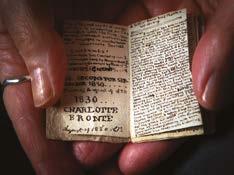
You can find out more about the museum at bronte.org.uk The house is called a Parsonage – this is the name given to the house of a vicar.

In 1842, Emily and Charlotte went to school in Brussels to improve their French. There Charlotte fell deeply in love with Constantin Héger who owned the school but was already married. We may understand how strong Charlotte’s feelings were for him when we read Jane Eyre.
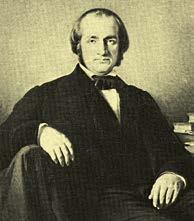

Charlotte and her sister continued to write. Charlotte sent some of her work to a writer, Robert Southey. He replied it was not the job of women to write. This gave Charlotte an idea – the three sisters could sign their work as Currer (Charlotte), Ellis (Emily), and Acton (Anne) Bell. These men’s names would hide the fact that they were women writers.
In early nineteenth century England, writing was not seen as the right thing for women to do, especially if they were from ‘good’ families.
In 1847, the three Brontë sisters were all published. Emily with Wuthering Heights, Anne with Agnes Grey, but Charlotte’s Jane Eyre was the biggest success.
Branwell also wanted to be a writer and a painter, but was not successful. He was often depressed, then he got tuberculosis in 1848. He died in September, aged 31. Sadly, he passed on tuberculosis to Emily and Anne and both died soon after. Emily was 31 and Anne 29 years old.
Branwell gave us the most famous painting of his sisters. You can see this at the National Portrait Gallery in London. He originally included himself, but later painted over his face.
Charlotte married Arthur Bell Nicholls, who worked with her father. Charlotte was famous by then, and was making money from her writing, but she died in 1855 aged 38. She is buried in the churchyard at Haworth.
Charlotte’s publisher –who made and sold her book – was Smith, Elder and Co. from London. Jane Eyre was their first big success.

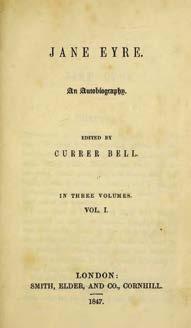
In their famous books, the Brontë sister explored strong feelings, subjects and events that were shocking for women to write or even talk about at the time.
Mrs reed, Jane’s aunt Jane and her aunt do not like each other.

Mr BrockleHurst, Head of lowood
scHool
A cruel and hard man.
Helen Burns Jane’s best friend at Lowood school.
Jane eyre
The main character of our story.
Jane’s cousins JoHn, eliza and GeorGiana
They are unkind to Jane as children.
Mr rocHester

The unhappy owner of Thornfield Hall.
st JoHn riVers
A man of the church, kind but also serious and cold.
BlancHe inGraM
A friend of Mr Rochester’s, beautiful but proud.
Mrs fairfax
A kind friend to Jane, looks after Thornfield Hall.
BertHa Mason
A woman with secrets.
adèle Varens Jane’s lively pupil at Thornfield Hall.
1 Jane Eyre was written in 1847, but talks about an earlier time (probably 1808–1832). Decide if the following are true or false about life in the early nineteenth century.
1 Rich people in England were starting to use electricity in their houses.

2 Houses were warm, with chimneys and open fires.
3 Windows were large, and let in a lot of light.
4 The rich employed people (called servants) to make their food and clean their houses.
5 Furniture and curtains were made from natural things; there was no plastic.
6 Only poor people used candles.
7 Nobody was interested in fashion.
8 Rich women had a special servant to dress them and make their hair beautiful.
9 Rich women had freedom to make their own decisions.
10 Rich men and boys had more power than the women and girls in their families.
2 Check your answers to 1 above, then answer the following questions. Discuss in pairs.
a If you travelled back to 1810, what would you find most strange or difficult about life at that time?
b What might you enjoy?
3 We meet Jane Eyre as a child of ten. Use the words and phrases in the box to fill in the gaps, and get to know her.

cold – tears – did not like me –dislike – screamed – everyone –horrible – sad heart – protect – scared
1 I did not like coming back to the house after a walk, with hands and a .
2 My aunt , and I did not like her.
3 My cousin John was a boy of fourteen. I was afraid of him. I was only ten and had no one to me.
4 I was and alone. ‘Let me out!’ I , trying to open the door.
5 ‘I am not ill,’ I said, but I could not stop my .
6 ‘I you more than anyone on this earth. […] I will tell what a terrible, unkind aunt you are.’
4 What do we learn about Jane Eyre? Give examples from the sentences above. The first has been done for you.
She is unhappy. (1, 5)
5 In this chapter you may see words you do not know. Use the sentences below to match each word with its definition.
1 (adj.) very bad

2 _________________ person employed by a rich family to work in their house
3 small lamp with candle inside, has a handle and glass windows
4 _________________ person with knowledge of medicine
5 family
6 _________________ large room in a house, for meeting and entertaining guests
7 _________________ person who says things that are not true
8 _________________ feeling of being free
9 _________________ tell someone they have done something wrong, and you are angry about it
10 _________________ (at that time) child with one or both parents not living

a My only relatives were my aunt and my three cousins.
b ‘That is not true,’ I said, ‘you are a liar.’
c I want the power to make my own decisions, I like my freedom.
d It was getting cold, so I told the servants to light the fire for me.
e It was dark, so I lit a lantern to take outside.
f ‘You are a horrible and wicked boy,’ I said.
g I was living with my aunt because I was an orphan
h When our friends arrived, we took them into the drawing room.
i I was ill, so my mother called the pharmacist to ask his advice.
j Whenever I was rude to my aunt, she told me off
6 Choose two new words and use them in sentences of your own.
7 Listen to the first part of Chapter 1, then write five things that happen.

8a What do you think will happen in the rest of Chapter 1?
8b When you get to the end of Chapter 1, look back at your answers. Were you right? Were you wrong about anything? Discuss in pairs.
Without modern medicine, people often died young at that time; baby Jane was lucky to have a rich family to look after her.
Jane does not have a teacher; she learns only from the books in her uncle’s library.
The rain was coming down too hard to be outside. I was glad. I did not like coming back to the house after a walk, with cold hands and a sad heart.
My parents died when I was a baby and I went to live with my Aunt and Uncle Reed at Gateshead. On this winter’s day my cousins Eliza, John and Georgiana were with their mother. She had sent me away but I did not mind. My aunt did not like me, and I did not like her. I went to the library, took a favourite book and sat in a window hidden by a curtain, but my happiness did not last long.
‘Where is she?’ asked John, coming into the room.
‘She’s behind the curtain, I’m sure,’ said Eliza.
John was a horrible boy of fourteen. I was afraid of him. I was only ten and had no one to protect me.
‘You rat*!’ he said, pulling the curtain back. He took the book and threw it at my head, ‘those are our books, not yours.’
‘Wicked* and cruel boy!’ I shouted.
rat you might call someone a rat if you are angry with them wicked (adj.) very bad

My aunt and our servant* Bessie came running to see what the noise was.
‘Horrible child!’ my aunt said to me, although I had done nothing wrong, ‘Lock her in the Red Room!’
The Red Room was never used. My uncle had died in there. I was scared and alone. When it was dark, I saw a light come into the room. Looking back now, it must have been a lantern* in the garden, but in my child’s mind it was the ghost of my poor dead uncle.
‘Let me out!’ I screamed, trying to open the door.
Bessie unlocked the door. I took her hand.
‘I saw a light, I thought a ghost would come.’
My aunt arrived and pushed me back.
‘You will stay in there,’ she said, angrily, ‘until you learn how to behave.’
I was so terrified I fell onto the floor.
When I woke I was in my bed. Bessie was there, and Mr Lloyd, the pharmacist*.
‘Are you ill, Miss Jane?’ he asked kindly.
‘I am not ill,’ I said, but I could not stop my tears.
‘How can you be unhappy in this lovely house?’
Bessie was called away, so I told Mr Lloyd how unkind everyone was to me.
‘I see. Do you have other relatives*?’
I shook my head.
servant person employed by a rich family to work in their house lantern small lamp with candle inside pharmacist person with knowledge of medicine relatives family
We see how unkind Jane’s aunt is to her; we learn later why she does not like Jane.
Being in the Red Room is a frightening moment for Jane, but she will learn to control her fears by the end of the story.
Charlotte Brontë often talks about ghosts, spirits, and strange events in Jane Eyre.

‘Would you like to go to school?’
I did not know what a school was, but I liked the idea of leaving Gateshead.
‘I will speak to your aunt,’ said Mr Lloyd.
The house was full of guests at Christmas and New Year but my aunt did not want to see me. Only Bessie was kinder to me. She brought me books and nice things to eat.
On the fifteenth of January, my aunt called me to the drawing room*. I was both afraid and excited –perhaps I would hear about my school. Next to my aunt stood a tall man with a hard, unkind face.
‘Mr Brocklehurst, this is Jane Eyre,’ my aunt said.
‘Well, Jane Eyre, are you a good child?’
‘She is not,’ my aunt said, ‘she does not tell the truth.’
I felt so angry. How could she say such a thing about me?
‘I am sorry to hear this,’ Mr Brocklehurst said, ‘do you know where naughty children go when they die?’
‘To hell, Sir.’
‘Yes, they do. Mrs Reed, do not worry, at Lowood School we do not allow liars*.’
‘I am not a liar,’ I said angrily to my aunt when he had gone, ‘if I was, I would say that I love you, but I don’t! I dislike you more than anyone on this earth. When I get to school, I will tell everyone what a terrible, unkind person you are.’
drawing room large room in a house, for meeting and entertaining guests liar person who says things that are not true
Mr Lloyd believes Jane, and wants to help her find a better life.
As a child, Jane is often very angry, and is never afraid to tell people what she thinks. As she grows older, she learns to live more calmly.
The Christian ideas of heaven and hell were very real for most people at this time. Charlotte Brontë grew up with a father with strong Christian views.
We learn the name of Jane’s new school. Mr Brocklehurst is the head of the school.

Mrs Reed is worried what Jane will say about her outside Gateshead. She knows she is behaving badly towards Jane! Jane is an unusual girl at this time – she wants and fights for her freedom.
At this, my aunt looked frightened.
‘Dear Jane, what is the matter with you? I wish only to be your friend.’
‘I am not your dear and you are not my friend. Send me to school. I hate living here!’
My aunt left the room and I felt a great freedom* – I had told her everything I thought. Later, I realised I had behaved very badly.
‘I have good news for you,’ Bessie told me that evening, ‘you’re leaving us soon. Now, Miss Jane, you strange, angry child, will you miss me?’
I put my arms round her, ‘You always tell me off*, Bessie, but I will miss you.’
freedom feeling of being free tell someone off tell someone they have done something wrong, and you are angry about it
Jane leaves her friend Bessie to go to school.Two days later, at five o’clock on a dark winter morning, Bessie came to wake me. I had a long journey ahead, but I was happy. I would never have to see my aunt or my cousins again.
At the school, I met two young women.
‘This child is young to have made such a journey alone. She looks tired. Give her something to eat and send her to bed,’ one said, touching my cheek softly.
Next day, we woke early. After morning lessons, which we all took in the hall, we had a breakfast that tasted so bad no one could eat it. Then we were sent outside. I had so many questions and went to speak to a girl I saw reading a book.
‘What is this school?’
‘It is for girls who are orphans*,’ she said.
‘Are you an orphan?’
‘My mother is dead,’ she replied.
‘Are you happy here?’
‘You ask too many questions. I would like to read.’
This girl was older than me and in a different class. That afternoon she was punished for not knowing the answer to a question. She did not cry from shame or because she was embarrassed, as I would have done. She stood quietly, looking at the floor. This was my first day at Lowood School.
orphan (at that time) child with one or both parents not living
In the early nineteenth century, roads were bad and journeys took a long time. People travelled by horse or coach. Jane arrives alone and tired at her new school. She has never been away from home before.
Children at this time were often punished. Jane cares a lot about what people think of her.
1 Are the following statements true (T) or false (F)?
1 Jane comes back from a walk feeling cold and sad.
2 Eliza tells John where Jane is hiding.
3 Jane sees a ghost.
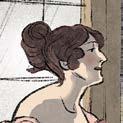
4 Mr Lloyd thinks Jane is wrong to be unhappy at Gateshead.
5 Aunt Reed is angry because Jane will tell everyone she is unkind.
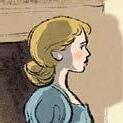

6 Bessie and Jane will miss each other when Jane goes to school.
7 Jane is afraid to be travelling to school by herself.
8 Jane’s new friend is stronger and more patient that she is.
2 Write what you know about these characters. Use complete sentences.
1 Write questions to help these people get answers.
1 Mr Lloyd – is Jane ill
2 Mr Lloyd – would Jane like to go to school
3 Mr Brocklehurst – what Jane believes is the punishment for liars when they die
4 Bessie – what will Jane feel about her when she leaves
5 Jane – find out about the school from her new friend
6 Jane – find out if her friend’s parents are still alive
2a In English, we add +ing to verbs for different reasons. Match the below with the correct explanation.
1 The rain was coming down too hard for a walk.
2 ‘You rat!’ he said, pulling back the curtain.
3 ‘Send me to school. I hate living here.’
4 ‘I have good news, you’re leaving us soon.’
a Verb of feeling + another verb that talks about a situation, not a single event.
b Doing one thing while doing/saying something else.
c Present continuous to describe future plans.
d Past continuous – event in the past that happens over a period of time.
2b Choose two of the verb forms above, and write your own sentences.
Read the texts (A-H) then match each one with an explanation (1-7) below. Use each text once only. The first one (0) has been done for you as an example.
A I went to the library, took a favourite book and sat in a window hidden by a curtain, but my happiness did not last long.
B ‘You rat!’ he said, pulling the curtain back. He took the book and threw it at my head, ‘those are our books, not yours.’
C Looking back now, it must have been a lantern in the garden, but in my child’s mind it was the ghost of my poor dead uncle.
D My aunt arrived and pushed me back. ‘You will stay in there,’ she said, angrily, ‘until you learn how to behave.’
E On the fifteenth of January, my aunt called me to the drawing room. I was both afraid and excited – perhaps I would hear about my school.
F My aunt left the room and I felt a great freedom – I had told her everything I thought. Later, I realised I had behaved very badly.
G ‘This child is young to have made such a journey alone. She looks tired. Give her something to eat and send her to bed,’ one said, touching my cheek softly.
H That afternoon, my friend was punished for not knowing the answer to a question. She did not cry from shame or because she was embarrassed, as I would have done.
1 Someone isn’t sure what to think.
2 Someone cares about another person.
3 Someone understands they were wrong about a belief they had.
4 Someone does something, then later feels bad about what they did.
5 Someone compares their behaviour with a different person.
6 Someone doesn’t care about the feelings of another person.
7 Someone does not want to share their things.


1 In 2015 world leaders agreed to 17 ideas – or goals – to make our world a better place. Goal 4 is about giving a good education to all children and young people. Discuss your answers to the following questions in pairs.
a Read what these leaders said about education. Do you agree? Do you disagree?
Education helps your mind to become free, it opens up your thinking, and is very important for feeling good or proud about yourself.
b In Charlotte Brontë’s time, few people had enough money to send their children to school, and very few girls went to school even if they were from rich families.
What might stop people around the world from getting a good education today?
c In 1800s England, girls studied only basic reading, writing, maths, music, art, and how to look after a house.
What subjects do you think are important for all children and young people today?

2a In the next chapter we read about Jane at her new school. Look at the questions below, then discuss in pairs.
1 Do you think Jane will enjoy her school? Why/why not?
2 Discuss your own experiences – good and/or not – of school and education.
2b Now listen to the first part of Chapter 2 – does anything surprise you, or even shock you, about Jane’s school?



There were no taps or running water then, you had to wash using a jug and a bowl, often with cold water.
The girls at Lowood have a hard life, but there are moments of happiness, too.
My second day at Lowood was like the first, except that we could not wash – it was so cold that the water in the jugs was frozen. I found my lessons difficult. I had never studied before. The nicest time was a play hour at the end of the day. The voices of the girls grew joyful*, the fires burned brighter, and we were given a piece of bread and a small cup of coffee. I went to speak to my friend. Her name was Helen Burns.
‘Helen do you wish to leave here?’
Although life is hard at Lowood, Helen is grateful to get an education. It was still unusual for poor girls to go to school in England in the early 1900s.
‘No, I was sent to Lowood to get an education. Why would I go away before I have learned what I need to?’

‘But, I hate anyone who punishes me when I have done no wrong.’
‘We all need to be corrected, Jane.’
I had been at Lowood three weeks when Mr Brocklehurst appeared. I had been afraid of this. Now he would tell the whole school what a bad child I was.
‘These girls eat too much,’ he said to going over to
joyful full of happiness

Charlotte experienced extremely strict religious teachings at her own school. Mr Brocklehurst's religious ideas are similar to those of the headmaster at Cowan Bridge School.
There is one way of life for the girls at the school, and another for the rich Brocklehursts.
Miss Temple, the kind teacher I had met on my first night. ‘And what – what is that girl with curled* hair? The girls must always look plain.’
‘It is Julia Severn,’ replied Miss Temple, ‘her hair curls naturally.’
‘Naturally? We do not allow nature here! Cut her hair off. In fact, cut all the girls’ hair off.’
At this moment, Mr Brocklehurst’s wife and daughters arrived. Their hair was beautifully curled and they wore lovely dresses, not plain clothes like us.
I was hiding behind my book, but it slipped* from my hands and crashed to the floor. Mr Brocklehurst saw me and told me to stand on a stool*.
For some Christians at the time, girls and women were born wicked, and therefore had to be controlled and watched closely.
‘Ladies,’ he said to his family, then, ‘Miss Temple, teachers and children, you see this girl? She is young, but the devil already lives in her. Stay away from her! This girl is – a liar!’
‘How terrible!’ said one of the young Miss Brocklehursts.
‘She will stand there for the rest of the day. Let no one speak to her,’ he said.
At the end of the day, the hall emptied. I sat by the fire to cry. Helen came and sat with me.
‘Helen, why do you stay with a girl everybody believes is a liar.’
curled not straight, that hangs in waves or circles slipped moved quickly and easily stool
‘Everybody, Jane? There are only 80 people here and I think they feel sorry for you.’
I put my hand in hers.
‘Besides, if all the world believed you to be wicked, but you were innocent*, you would not be without friends.’
I rested my head on her shoulder and we sat like that until Miss Temple came.
‘Why did Mr Brocklehurst say those things about you, Jane?’ she asked me.
I told her about my life before Lowood , remembering to stay as calm as Helen. When I told her about Mr Lloyd, Miss Temple stopped me.
‘I know of this man, I will write to him. Now, Helen, how are you? Are you still coughing? How is the pain in your chest?’
And that was how I learned my friend was ill. Some time later, a letter arrived from Mr Lloyd. I was telling the truth, he said. I was relieved*. Now, no one would think I was a liar.
Spring and summer were better at Lowood, until a terrible disease called typhus hit the school. Many of the girls became very ill and died. Lessons were stopped and I spent my days outside, but I was sad. Helen was ill with tuberculosis, not typhus. I was too young to understand how ill she was until one day her nurse told me.
innocent behaving in a good way relieved when you stop feeling worried about something
Helen gives Jane an important lesson. Jane does not need to worry about the opinion of others if she knows she has not done wrong.
This book is both a Gothic story and a ‘bildungsroman’ – a German word describing stories that show the development of the main character as they grow from a child into adulthood.
Typhus was a serious illness at this time. You get it when an insect bites you and bacteria go from the bite into your blood.
Tuberculosis was another serious disease at this time. Many people died from it.
Many people believe that Helen Burns is based on Charlotte’s oldest sister Maria who died of tuberculosis in 1825 when she was 12. Charlotte missed her sister terribly after she died.
‘The doctor says Helen will not be here long.’
Poor Helen! That night, I waited until everyone was asleep, then went to her.
‘Can it be you Jane?’ she asked.
I got onto her bed and kissed her.
‘You must not be sad, we all die one day, and when I am gone I will be in heaven with God.’
‘Will I see you there when I die?’
‘You will. Goodnight, Jane.’
‘Goodnight, Helen.’
That night, my dear friend Helen Burns died.

After so many girls died, questions were asked. When the truth came out about Mr Brocklehurst, he was sent away and life got better. I was a pupil there for six years, a teacher for two. Miss Temple was my friend but when I was eighteen, she got married. The day she left us I knew I could not stay. I wanted a new life. Perhaps I could find work as a governess*. I put an advertisement in the local newspaper. A week later, a letter arrived from a Mrs Fairfax, of Thornfield, near Milcote. She wanted a governess for a girl of nine.
Milcote was far away to the south, but the writing was neat and old fashioned, and the money good. I asked for references* to be sent to Mrs Fairfax from the school and my Aunt Reed, and was accepted for the position*.
On my last evening, dear Bessie arrived to see me.
‘How is everyone at Gateshead?’ I asked.
‘Miss Georgiana is a beauty, Miss Eliza is unhappy, but Mr John leads a very bad life spending all your aunt’s money.’ And she gave me other news. ‘Five years ago a fine gentleman* called for you. He said he was your uncle. He was sorry not to see you – he had to return to Madeira the following day.’
Next morning, I left Lowood forever.
governess woman who teaches the children of a rich family at their home references letter to a possible employer from people who know your work experience and education position old word for job gentleman man with money and a good name in society
Until 1944, British women had to stop teaching after they got married.
At that time, women with an education could earn money as a teacher or governess (a private teacher in a family). There were not many other jobs open to women.
Jane learns that she has another uncle, and that he lives on the island of Madeira, which is in the Atlantic, off the coast of Morocco.
1 Put these events from Chapter 2 in the correct order.
a Mr Brocklehurst tells everyone that Jane is a liar.
b Miss Temple says she will write to Mr Lloyd about Jane’s story.
c Jane learns that Helen is dying, and goes to say goodbye to her.
d Mr Lloyd replies to Miss Temple that Jane is telling the truth.
e Bessie visits Jane, then Jane leaves for her new job as a governess.
f It is so cold that the water in the jugs for washing is frozen.
g Jane becomes a teacher at Lowood.
h Jane speaks to her friend during play hour, and learns her name.
i Mr Brocklehurst is removed from the school, and life gets better.
j Jane is made to stand on a stool in front of the whole school.
k Jane learns that Helen is ill.
l In the spring and summer, many Lowood girls get ill and die of typhus.
2 Imagine you are Jane aged ten. Write a letter (up to 100 words) home to Bessie. Tell her:

• who you meet at your new school
• what happens to you, and how you feel about it
• what happens to your best friend
• what happens to the school
1 These sentences use the wrong conjunctions. Can you correct them?
before – until – when
1 ‘Why would I go away when I have learned what I need to?’
2 ‘I hate anyone who punishes me before I have done no wrong.’
3 Helen and I sat like that before Miss Temple came.
4 I waited when everyone was asleep, then went to her.
2 Use the correct word in the box to fill in each gap. The first is done for you.
of – for (x2) – on (x2) – to (x2) – over – off
He told me to stand the stool.
on
1 I sat next to her and rested my head her shoulder.
2 He arrived in the room and went to speak to her.
3 ‘I’m not afraid you, even when you tell me off,’ I said.

4 At the end of the day, I got the stool and sat by the fire.
5 The teachers often punished Helen no good reason.
6 ‘They don’t dislike you, they feel sorry you.’
7 ‘I can’t visit you, I have to return my home in Madeira.
8 I tried to hide behind a book, but it slipped and crashed the floor.
Read these questions and the 3 possible answers below. Then, listen to the recording and choose the correct answer A, B, or C for questions 1-5. The first one has been done for you. There is only one correct answer.
0 Questions were asked about Lowood school because…
A the girls had no one to protect them.
B ✔ so many girls died that summer.
C everyone knew the girls were hungry and cold.
1 After this, Mr Brocklehurst…
A told the truth about life at Lowood school.
B made life better for the girls.
C no longer controlled the school.
2 When Miss Temple left Lowood, Jane…
A did not want to stay at the school.
B wanted to leave with her.
C was not allowed to stay at the school.
3 Jane found a job…
A at a local newspaper.
B by writing to Mrs Fairfax.
C by letting people know she was looking for work.
4 Before Jane could have the job…
A Mrs Reed had to say yes.
B her family and colleagues had to write to Mrs Fairfax.
C Mrs Fairfax wanted to see that her handwriting was neat.
5 Jane learned from Bessie that…
A she was happy Jane was going to the south.
B a relative wanted to see her.
C her cousins were all leading bad, unhappy lives.

1 Global goal 3 is about helping everyone, from the youngest to the oldest, live healthy and good lives.
Good well-being is when you live a comfortable, happy and healthy life.
Jane experiences the terrible results of typhus and tuberculosis. Today, people with these diseases can be helped with medicines, while tuberculosis can be stopped with vaccines.
In the past, millions of people died of typhus, today it is a rare illness. Typhus is carried by small, biting insects, and travels quickly when many people live together in small spaces.
a Why do you think typhus is rare now when it was so common in Charlotte Brontë’s time?
Sadly, millions of people still die from tuberculosis or TB. It can be stopped but billions of dollars are needed.
b Use the words in the box to discuss how you think we can make TB less common in the world.
vaccines, doctors, hospitals, medicines, money, education, free healthcare

2 Listen to start of Chapter 3 – The Fire in the Night, then write





• your first impressions
• one thing that you have questions about




Mr Rochester is disabled in the fire. He is rich enough to pay people to help him – not everyone is as lucky.

The UN asks us to imagine a world in 2030 where those of us with disabilities are included in every part of life. They want to make sure that “no one is left behind”.
Inclusion is when all people can live as equals. This includes people with disabilities – disabilities that you can see and those that you can’t.
If we are disabled, we can find it difficult to get work. Imagine you are a business owner, how can you improve inclusion for disabled people at work? Read this advice. Then discuss in pairs.


1 Speak to disabled people about problems they meet, then work together to find solutions. What difficulties might disabled people have where you work or study?
2 Find out what is or isn’t possible. Those with disabilities may share some similar experiences or difficulties, but they are individuals with different needs. How could you make sure disabled people are listened to as individuals?
3 Use the right language. Language can make people feel respected. Find out from disabled people what words help and what words don’t.
4 Find solutions! Small changes can make a big difference. For example, can you offer working from home or different working hours? What else could you do?
The world worries about disability more than disabled people do. Warwick Davies, (English actor, born 1970 – disabled and one of the world’s highest paid actors)


‘I have a disability, yes that’s true, but all that really means is I may have to take a slightly different path than you.’ Robert M. Hensel (born 1969, disability campaigner)



1 Test your knowledge of new vocabulary in this book with this word search.
1 when your cheeks are red with embarrassment, you are…
2 bad and frightening dream
3 two weeks
4 when two things are of the same importance
5 behaving in a good way, opposite of bad/wicked
6 (noun) having power, being strong
7 when you don’t trust someone, you are…
8 strange, not natural
9 letter to a possible employer from people who know you
10 family
11 free to make your own decisions
12 money paid to a person too old to work
13 change what you look like to hide who you are
14 total loss of hope
15 destroyed
16 person who shows their love and care for others
17 feeling of being free
18 terrible, powerful sadness
19 (adjective) very unhappy and sad
20 go to get something / someone
21 angry, not calm
22 when you are not sure about someone or something
2 Write a short description of three characters in this book. Include, where you know it:
• their childhood;
• their relationship to Jane (if any);
• important events in their life;
• their personality;
• what happens to them in the end.
3 Read the text below and answer the questions, giving examples. Ten-year-old Jane lives with her unkind Aunt Reed until she is sent to a terrible school. Many of the girls there, including Jane’s friend Helen, become ill and die. At 18, Jane starts work as a governess at Thornfield Hall, which is owned by Mr Rochester. Jane falls in love with him, and after saving his life in a fire, thinks he might love her too. One night a visitor, Richard Mason, is attacked in the house. After that, Mr Rochester and Jane agree to marry, but just before the wedding a woman comes into Jane’s room and tears her veil.
On the wedding day, Jane learns that Mr Rochester is already married – to Richard’s sister Bertha. Jane runs away and lives with Diana, Mary and St John Rivers until her uncle John dies and leaves her his money. She goes back to Thornfield. It has been burned down by Bertha. Bertha is dead, and Mr Rochester has been disabled. Jane and he get married, and have a child.
1 What do you think about Jane’s life with the Reeds at Gateshead?

2 What do you think about Jane’s time at Lowood School?
3 What is Jane’s life like at Thornfield?
4 Why do you think Mr Rochester falls in love with Jane?
5 In what ways does Jane change during this story?
4 First, read these questions and the 4 possible answers below. Then listen to the recording from Chapter 8 twice. While listening, choose the correct answer A, B, C or D for questions 1-5 only. The first one has been done for you. There is only one correct answer. After the second listening, you will have time to check your answers.
0 When Jane saw Thornfield again, …
A she worried about what to say to Mr Rochester.
B it had recently burned down.
C she asked someone who was living there what had happened.
D ✔ there was nothing left of the house, it was a ruin.
1 Jane had to go back to the village inn, because…
A the house was destroyed, with grass growing inside.
B she could not understand what had happened.
C the house was empty and no one was living there to ask.
D she was tired after the shock of finding the house destroyed.
2 The innkeeper was able to tell Jane what had happened because…
A he had known Mr Rochester when he was a boy.
B he went to the house while it was on fire.
C she both wanted and didn’t want to hear about the fire.
D she was not from the area.
3 Mr Rochester was badly hurt because…
A the governess had disappeared.
B he stayed in the house trying to help everyone escape.
C he was so in love with the woman he wanted to marry.
D he wanted to put his own life in danger.
4 Mr Rochester went up onto the roof…

A because the flames were too high inside the house.
B because he remembered Jane going up there with Mrs Fairfax.
C to try to stop the fire.
D to try and save his wife, Bertha Mason.
5 Mr Rochester got hurt…
A because the fire had made the house unsafe.
B because he couldn’t save Bertha.
C because Bertha was shouting.
D because he saw a figure on the roof.
5a Read the texts below, then decide who (A–H) is being described. The first one (0) has been done for you.
0 I This person is unhappy because they have someone in their life they do not like. They do not care if other people are hurt by their lies.
1 This person goes to live in a new house after their mother dies. They have their own servant and teacher. They are able to love and be loved by people around them.
2 This person is successful but doesn’t have everything they want in life. They do not always make fair decisions, but are able to care about others and try to protect them.
3 This person has a difficult life. They are not always able to understand what is happening, and can do things that make life very difficult and dangerous for others.
4 This person gives a lot of time to other people, but does not always know how to listen to others and doesn’t always respect them. This person doesn’t understand love.
5 This person is kind, and enjoys a comfortable life. They sometimes get lonely and worry about other people, but are not afraid to talk about difficult subjects.
6 This person is unkind and unhappy. They don’t know how to choose good friends. They are selfish and make bad choices that hurt their family.
7 This person does not always tell the truth. However, they are able to be brave when they need to be, can take action quickly, and like things to be correct.
8 This person doesn’t care if they hurt people they believe are beneath them. They want to be the centre of attention and are interested in what they can get from others.
A Blanche Ingram
B St John Rivers
C Bertha Mason
D John Reed
E Adèle Varens
F Mrs Fairfax
G Richard Mason
H John Eyre
I Aunt Reed
5b Using the descriptions above, discuss in pairs, giving reasons for your decisions
• your least favourite of these characters
• any of them you feel sorry for


6 Write a short story up to 100 words. Start your story with the words in the box.



I was on the third floor of the house when I heard the strangest sound. It was a deep and unnatural laugh. It was not happy, though, it was tragic. I wanted to find out who it was, so I…

7 During the party at Thornfield someone receives a letter from a friend.
1 Read the letter
, IhearthereisapartyatThornfield.Tellmeall aboutit!Iwanttoknowwhatyouaredoing,whoisthere, andhowyouarefeeling.

2 Choose a character from this list.
• Blanche Ingram
• Mr Rochester
• Jane Eyre
• Mrs Fairfax
3 Write a reply (35–45 words) from your chosen character to their friend.

Location: In the garden at Thornfield, by the old chestnut tree
Who: Jane Eyre and Mr Rochester





Background: Jane Eyre is getting ready to leave Thornfield. She and everyone else believe that Mr Rochester will soon marry Blanche Ingram
Jane Eyre (seriously): I grieve to leave Thornfield, I love Thornfield because I have lived a full and happy life here, for a short time at least. I have talked with and known you, Mr Rochester. And I grieve to leave you, because I will never see you again.
Rochester: Then why must you leave?























Jane Eyre: Because soon you will marry Blanche Ingram. I cannot stay here if you have a wife!
Rochester (angrily): My wife! What wife? I have no wife.
Jane Eyre (surprised): But you will soon.
Rochester (smiling now): When you leave you will forget me.
Jane Eyre (shocked): That I will never do.
Rochester (excited): Then you must stay!
Jane Eyre (suddenly very angrily): No! I must go! Do you think I could stay and become nothing to you when you are married to Miss Ingram? Do you think I am some kind of machine with no feelings?
[Mr Rochester listens with a serious face.]
Jane Eyre (with great feeling): Do you think that because I am poor, plain, and little that I am soulless and heartless? You think wrong! If God had given me beauty and money, I would make it as hard for you to leave me as it is for me to leave you! This is my true self speaking to you, as if we had both died and stood at God’s feet equal – as we are!
Rochester (calmly): As we are, Jane, as we are.
Jane Eyre: But we are not equal, because you are a married man, or are soon to be a married man. And your new wife is not your equal. I do not believe that you love her. I would never marry without true love. So, no, we are not equal, I am better than you because I would only marry for love. Now, let me go.
Rochester (gently): Jane, stay calm, you are like a wild bird that has been caught.


Jane Eyre: I am not a bird, I am a free woman, and I use that freedom to leave you.
Rochester (quietly): Jane, don’t go. I am to be married, but not to Miss Ingram. I want you to be my wife.
[Jane looks at him in shock, she doesn’t believe him. She starts to cry.]
Jane Eyre (crying and angry): You are laughing at me!




Rochester: Do you doubt me, Jane? Do you think I am a liar? You are right, I do not love Miss Ingram and she does not love me. She only wanted me for my money. Do you remember the old fortune teller? (Rochester smiles) Well, she told Miss Ingram that Mr Rochester did not have any money. Since then, both Miss Ingram and her mother have stayed away from me.
[There is a moment of silence, Jane still does not believe him.]
Rochester (speaking seriously): Jane, I am serious. I am asking you to take me as your husband. I ask you to pass through life at my side. I want you to be my second self. Will you be my wife, Jane?
Jane Eyre (carefully): Do you truly love me? Do you seriously wish me to be your wife?
Rochester: I do. I swear it.








Jane Eyre (after a moment): Then, I will marry you.
[A strong wind starts to blow. There is lightning in the sky. A storm is coming.]
Rochester (happily): Hurry inside, my dearest Jane.
[They quickly leave the garden and go to the house.]
My favourite character is because ____________________________________________________________________
My favourite moment in the book is ______________________________________
I really don’t like ___________________________________________________________ because ____________________________________________________________________

I like / don’t like this story because
I won’t forget ____________________________________________________________
Jane is a 10-year-old orphan who lives with her unkind aunt’s family. ey mistreat her but Jane is not a submissive child and her aunt decides to send her to Lowood, a school for girls who have lost their parents. It is a terrible place. Jane survives the school, and aged 18, she nds work as a governess at orn eld Hall, where she meets the mysterious Mr Rochester and falls in love with him... will Jane ever nd the happiness she deserves?


Charlotte Brontë (1816-1855) is one of the most important writers of the nineteenth century. e writer transformed her personal experience into novels with universal appeal, and her writing is innovative, combining Romanticism, Naturalism and Gothic Melodrama. Her books include Poems by Currer, Ellis, and Acton Bell (1846), Jane Eyre (1847), Shirley (1849), Villette (1853), Emma (un nished), e Professor (published posthumously in 1857).

WITH PC OR MAC Download Audio from www.gruppoeli.it
www.eligreenwich.it




FLIP BOOK
DIGITAL AND INTERACTIVE VERSION OF THE BOOK (LOOK AT THE INSIDE FRONT COVER FLAP)
www.gruppoeli.it € 9,80
